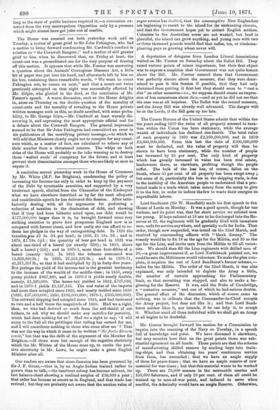The House was counted out both yesterday week add on
Tuesday, a matter of great grief to Sir John Pakington, who had a motion to bring forward condemning Mr. Cardwell's conduct in relation to "the Cornwall Rangers ;" and a matter of still greater grief to him when he discovered that, on Friday at least, the count-out was a premeditated one for the very purpose of fencing off this motion. It appears that while Mr. Forster was answering a question about the Animals' Contagious Diseases Act, a little bit of paper was put into his hand, and afterwards left by him on his box, containing these remarkable words, "We want to count Pakington out, he comes on next," and that a count-out twice previously attempted on that night was successfully effected by Mr. Gilpin, who gloried in the deed, at the conclusion of Mr. Forster's speech. A warm discussion, such as the House delights in, arose on.Thursday on the double question of the morality of count-outs and the morality of revealing to the House private written messages such as this, no doubt ascribed, with some proba- bility, to Mr. George Glyn,—Mr. Cardwell at least warmly dis- avowing it, and expressing the most appropriate official zeal for a debate about the Cornwall Rangers. The general impression seemed to be that Sir John Pakington had committed an error in Ids Publication of the mortifying private message,—to which we will add that Ministers clearly ought not to conspire for any count- outs which, as a matter of fact, are calculated to relieve any of their number from a threatened censure. The whips on both sides of the House will probably so far take warning as to destroy these wafted seeds' of conspiracy for the future, and at least prevent their dissemination amongst those who are likely at once to expose it.


































 Previous page
Previous page